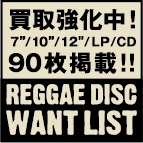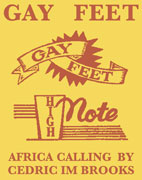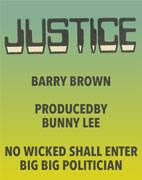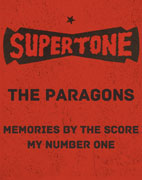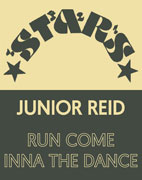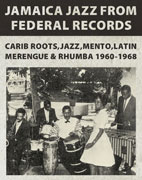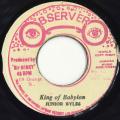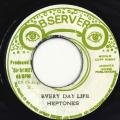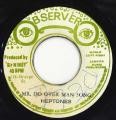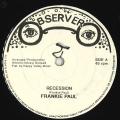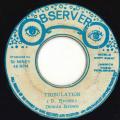ObserverText by Harry Hawks
One of Jamaica's most inventive and radical record producers 'The Observer' Holness has always been a name to watch out for...
Observer
| Founded | 1970 |
| Place of Establishment | Kingston Jamaica |
| Main Studio(s) | Channel One Joe Gibbs Randy's Studio |
| Founder | Winston 'Niney' Holness |
| Producer(s) | |
| Related Artist(s) |
He also worked as a record salesman for upcoming producers, Clancy Eccles and Lee 'Scratch' Perry(Lee Perry), before moving on to Bunny Striker Lee Striker who employed Niney to promote and sell his records. Bunny recalled that Niney was a superb salesman:
"Niney was a salesman for me and so Niney became one of the best salesmen for Pama and myself in Jamaica. I bought him a bike and he'd go to every dance promoting the tune them until every sound man in Jamaica knew Niney." Bunny 'Striker' Lee
A man who was always willing to properly promote his protégés Striker soon invited Niney accompany him to the recording studio.
"Niney started coming to the studio now. Niney had plenty of ideas about the business... So you have to say Niney started off producing with me and that gave Niney a chance to branch off and start doing his own thing 'cause he's a very creative person." Bunny 'Striker' Lee
In 1969 Niney began to work on a freelance basis with another young record producer, Joel 'Joe Gibbs' Gibson(Joel Gibson), as Niney later recalled.
"That was just my night time work because I used to work for Bunny Lee during the days and Scratch. Night time was like my hustling with Joe Gibbs, earn some extra money." Winston 'Niney The Observer' Holness
His productions with Joe Gibbs| included two records based around 'spaghetti western' themes that were very early forays into the music that would become known a number of years later as dub. Niney is acknowledged as being "among the first to feature sound effects and disruptive false starts and breaks". Both 'Navado Joe'/'Straight To The Head' credited to Joe Gibbs & The Destroyers and 'Franco Nero (Version 1)/'Franco Nero (Version 2)' credited to The Destroyers featured previously unheard, and unheard of, mixing techniques. Niney had been known as The Destroyer but decided to change his name to The Observer:
"I did name Destroyer before. When I decide to start out on my own I remember Lee Perry come down and said to me 'I am The Upsetter so you can't destroy me...' Gradually I go to the artwork guy and said I want to change my label... name it Observer." Winston 'Niney' Holness
His breakthrough came with the apocalyptic 'Blood And Fire' in 1970. The record was a revelation and prophesied the impending wrath of "blood, blood, blood and fire" for unbelievers in an avowed celebration of Rastafari. Nothing had ever sounded quite like this before...
"Late in 1970 Niney became the talk of the town when he unleashed his powerful, physical, rebellious song of destruction, 'Blood And Fire' a song about Judgement Day. No mercy for the merciless... 'Judgement has come and mercy has gone'. It was a completely new direction for Jamaican music but one so distinct and unusual that it could not be copied." Carl Gayle
This remarkable record caused many repercussions including an altercation over its alleged similarity to 'Duppy Conqueror' which Bob Marley & The Wailers had recently cut for Lee Perry. Niney told Carl Gayle "Scratch said I version his tune... Well, when it play everybody say that's far different from Bob Marley's tune". 'Blood & Fire' went on to sell over thirty five thousand copies on Niney's Observers label and is rightly regarded not only as a reggae classic but also as one of the catalysts that began a revolution.
"In Niney's 'Blood And Fire' the beauty of the composition has to be heard to be believed...This is one of the reggae classics of all time." Rolston Kallyndyr & Henderson Dalrymple
Over the next few years, Niney established himself as one of the most inventive of Kingston's new wave of 'rebel' record producers. His productions ranged from the raw roots rebelliousness of Sang Hugh's 'Rasta No Born Yah', released through Lloyd F. Campbell(Lloyd Campbell) on The Thing label, to the more conventional sounds of Ken Boothe and their romantic 'Silver Words' which was a huge seller on Niney's Observer label in 1972.
"One of Ken Boothe's best tunes up until now is Niney's 'Silver Words'." Bunny 'Striker' Lee
But whatever the content of the lyrics Niney's forward productions were always instantly recognisable.
"No matter where you are you can always tell an Observer rhythm whenever you hear one. It's hard, it's brash and it has always got that unmistakeable stamp that says 'a Niney production'". Chris Lane
"Then he started working with Dennis Brown and, you know, the rest is history..." Bunny 'Striker' Lee
In the summer of 1973 Dennis Brown "shot to the number one position with 'Westbound Train'... a tune that had the introduction of an Al Green record ('Love And Happiness') and the subtlety of a sledgehammer". The combination of Niney and Dennis Brown dated back to when the pair had worked together for Joe Gibbs and now proceeded to come up with hit record after hit record including 'Cassandra', 'I Am The Conqueror' and 'No More Will I Roam'. The solid consistency of Dennis' work for Niney from this time remains a high point in the history of Jamaican music and, in addition to the many hit singles, two excellent albums 'Just Dennis' and 'Deep Down' were also released. In Swing Magazine's Annual Awards Dennis Brown was voted Jamaica's Top Male Vocalist for 1973 and Niney was presented with the accolade of Jamaica's Number One Producer the following year. Niney also worked extensively with deejays and U Roy hit with 'Train From The West', his version to Dennis' 'Westbound Train', Big Youth came on strong with a cut to 'Blood And Fire' entitled 'Fire Bunn' and I Roy scored a number of hits with The Observer including 'Sister Maggie Breast' and 'Point Blank'. Niney's dub album debut, 'Dubbing With The Observer', deconstructed a selection of his hit singles with Dennis Brown; mixed by King Tubby the set not only showcased the stunning Soul Syndicate rhythms but also highlighted the beauty of the original vocal tracks.
Niney relocated to France at the beginning of the eighties but returned to Kingston in 1983 where he reprised his late sixties role by working as an in house producer at the Hookim's Channel One studio on Maxfield Avenue, upgraded to sixteen tracks in 1979, and releasing his work on their new Hit Bound label. Niney worked on one of the earliest Yellowman albums at Channel One and also continued to produce his own records including Third World's classic 'Roots With Quality' and Sugar Minott's 'Lover's Race'. But, restless as ever, he moved on to New York before returning to Kingston in 1988 when he worked with Peter Tosh's son, Andrew Tosh, on a series of records including the acerbic 'Same Dog Bite You'. His extensive back catalogue has been compiled and released on a number of labels in Europe and America but Niney was never, ever one to rest on his laurels. In late 2012 he performed live and direct on the London stage backed by the capital's very own brothers in rhythm, Mafia & Fluxy, and in the following spring opened his own Observer Soundbox studio on Lyndhurst Road in Kingston.
"'He changes the beat' as they say in Jamaica. He's a searcher and a pacesetter. One of the few who keep Jamaican music constantly on the move, sustains its vitality, and does it without compromise, strictly for the grass roots." Carl Gayle
Sources:
Carl Gayle: Niney, The Observer Black Music Volume 2, Issue 21 August 1975
Noel Hawks & Jah Floyd: Reggae Going International 1967 to 1976 The Bunny 'Striker' Lee Story
Jamaican Recordings Publishing 2011
Rolston Kallyndyr & Henderson Dalrymple: Reggae, A People's Music Carib-Arawak Publications 1975
Chris Lane: Observing The Observer Pressure Drop (One) Autumn 1975
Date Added: Jul 14, 2014 / Date Updated: Jul 14, 2014
Copyright (C) 2024 Dub Store Sound Inc.
Related Item(s)
| Junior Byles - King Of Babylon(Observer)EX/SEW B:stamp |
B side) Ranking Buckers - Nebuchadnezze
| Heptones - Every Day Life(Observer)EX-/SEW/SACI/LOC |
B side) Observer - Life Every Day
| Dennis Brown - Tribulation(Observer)VG/SLD/stain |
B side) Observer Style - Tribulation Dub










